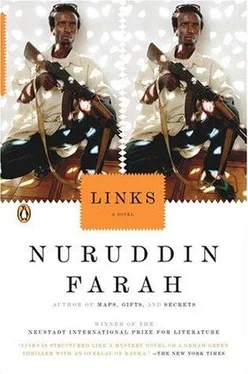The midwife paid for the food and the household expenses, and Jeebleh’s mother kept Caloosha out of mischief as well as she could, at the same time protecting her son and Bile from his bullying. Raised as brothers in the household efficiently run by Jeebleh’s mother, and paid for by Bile’s, the two boys became very close.
The world in which Jeebleh and Caloosha would be meeting today, if they met at all, differed greatly from the one in which they had met as children, and from the one in which Jeebleh had been a political prisoner and Caloosha his jailer.
The youth who came with the pot of coffee Jeebleh had ordered also delivered a message: Apparently a few clansmen of Jeebleh’s were at the front gate of the hotel, waiting to be let in. The men on sentry duty, the youth explained, wanted to know whether or not Jeebleh was prepared to receive them. When Jeebleh inquired how many there were, he learned that there were half a dozen, eager to speak to him about “family matters.”
Jeebleh told the youth that he wanted to drink his coffee in peace. He had other things on his mind, actually, and was in no mood to entertain a group of elder men who were likely only to bring further clan-related complications into his life. He finished his coffee and left by the back gate.
THE ROUGHLY DRAWN MAP TO CALOOSHA’S PLACE IN HIS HAND, JEEBLEH walked fast, with the light-footed gait of someone who knew where he was headed. He might have been a thief avoiding an angry mob sent to apprehend him. He wanted to get away from his clansmen, that was all.
He recalled how his mother had done everything possible to make sure that she and her only son would have nothing to do with this clan business. As a young woman, she had been given in marriage to a gambler with no self-honor, because he paid a dozen cows and a donkey as a dowry to her family. She hoped to raise her son in an enlightened way, educate him and make him believe in his own worth as a man. Soon after entering into her contract with the midwife, she bought herself a Singer sewing machine and, for starters, tailored the family’s clothes: her own and her son’s, and the two other boys’ and their mother’s as well. Her son was given the nickname “Jeebleh”—“the one with the pockets”—because his shirts, shorts, and trousers had huge pockets.
It was on a day such as this, when his so-called clansmen came around to be received as his blood, that he appreciated what the two inveterate loners had created.
No doubt the clansmen were there to remind him of his responsibility toward his blood community. He remembered how often his mother had warned him against such opportunists, who would turn up at his door with their begging bowls when he was doing well — the very same men and women who would disappear when he was the one in need. She had also warned him against Caloosha, whose cruel behavior was a threat to the continued existence of the family she and the midwife had so carefully held together. “Be your own man,” she would say, “not anyone else’s. And beware of your clansmen. They’ll prove to be your worst enemies, and they are more likely than not to stab you in broad daylight if you choose to have nothing to do with them.”
He walked purposefully, his heartbeat quickening with each step. There was no authority to dreams if the happenings during one’s waking hours did not tally with their thrust, he decided. He prayed himself sick, wishing for success in whatever he was trying to achieve.
A moment’s distraction helped him notice a richly woven spiderweb hanging down between the open-ended spaciousness of the morning sun and a mango tree, laden with its seasonal yield. While admiring the bewitching spectacle, he saw an old man in colorful rags hungrily demolishing a mango with the self-abandon of a child. The old man’s fingers must have been as sweet as a beehive, and a swarm of eager wasps descended on them, taking off and landing again, following every movement of his hands. A closer look at the man revealed a more disturbing sight: his highly unfocused gaze. The man washed his hands with water from a pitcher, then dried them, and started to speak as the mad do, wisely.
The old man was fascinating to listen to and wonderful to watch, his every gesture theatrical, and his voice a memorable baritone. Soon enough a crowd formed near him, and the space around the tree filled with curious spectators, including Jeebleh. The man spoke on and on, in speech so disjointed that not everything he said made sense to Jeebleh. But he could not tear himself away, and he stood there fascinated. The man behaved as hypnotists do, self-confident, as if aware of where his strengths lay. He seemed to be saying that the trouble with self-isolated communities was that they were “as unhealthy as a child’s toenail growing inward.” The crowd around the mango tree listened attentively. At one point, the man fell silent, then looked steadily at Jeebleh, outstaring him. A woman standing near Jeebleh raised her naked son so he might see what she described as “the spectacle.”
The old man was now proposing that a beggar given to spurious changes of mood was a dangerous one. “So beware, my brothers and sisters, of such beggars. Beware too of our politicians who think and behave like beggars— one day, they act normally and ask for donations from the international community, and the next day, they kill the foreigners who’ve come to help.”
He then asked the crowd, “Are you mad?” When no one responded, he asked, “Am I mad, then?” No one spoke. “Are you mad or are you sane? I want you to separate yourselves into two groups, those who are mad, and those who are sane.”
But nobody moved. The man repeated his instructions, and again nobody moved. People appeared disturbed by his indiscretion, and yet no one was ready to challenge him or oblige. Murmurs of disapproval were heard, the din growing louder as people talked among themselves. Even so, no one stood apart, or walked away, and no one declared himself to be mad or sane; everyone found comfort in staying with the crowd.
The old man changed his tack: “What if I asked you to separate yourselves into those who’ve murdered and those who haven’t? Will all those who’ve murdered please gather here to my left, and all those who’ve not murdered or harmed anyone, who’ve raped no woman, looted no property, will they please stand here to my right?”
Nobody obliged, but Jeebleh’s curious gaze fell on a military type, who broke into a heavy sweat. Now the old man danced a jig, and as he did so he had a smirk on his face, and his hands moved as though in imitation of a trained dancer performing the classical Indian dance-drama Kathakali — or so thought Jeebleh. The man cut a most impressive figure, with his stylized gestures now in vigorous motion, now gentle, his whole body moving in obligatory pursuit of a ritual, his index finger close to his nose, his hard stare focused on it, his squint disarming. The crowd grew, as more people came. The last group to arrive included a drummer, who beat in rhythm to the man’s chants.
Having seen and heard enough, Jeebleh left the area. A man followed him. When Jeebleh slowed, he noted that the man was keeping pace with him. He turned to confront the man shadowing him, looked at him fixedly, and said with a wry smile, “Are you mad or are you sane? Are you a murderer? Are you innocent of all crimes?”
“Ask me a serious question, and I’ll give an answer,” replied the man, his stare iron-tough.
“Don’t you think these are serious questions nowadays?”
There was something fierce about this man with rough edges, the type you see in films. The hard-stare guy introduced himself: “My name is Kaahin.” And he extended his hand to Jeebleh, who remembered his encounter with Af-Laawe at the airport and decided not to shake it.
Читать дальше












